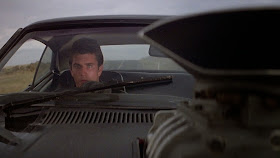Mad Max, dir. George Miller, scr. James McCausland, George Miller, st. Mel Gibson, Joanne Samuel, Hugh Keayes-Byrne, Steve Bisley, Roger Ward
Following a fuel shortage, towns and cities have begun to tear themselves apart, preyed on by vicious gangs of disenfranchised, anarchistic bike gangs, while the scrappy remnants of a severely depleted police force attempt to hold the very fabric of society together; there's precious little culture left, many buildings lie in a state of severe disrepair, and any trauma patients visiting a hospital are met with empty corridors and a skeletal staffing operation.
No, this isn't the UK after five more years of Tory rule, this is Mad Max, George Miller's nihilistic vision of a world on the apocalyptic precipice. Max turned thirty-six this year and after a long gestation period in development hell, the seventy year-old Miller is just about to release his fourth instalment - Mad Max: Fury Road - which, if the enthusiastic response to the chaotic beauty of the first trailer is anything to go by, looks set to kickstart a new triumvirate of movies.
In any case, it's interesting to re-visit the film that started it all. The enduring memory we are left with might be the sequels' expansive desert landscapes and the Wacky Races invention of all those chopshop vehicles, but Mad Max is notable for setting its dystopian science fiction actually before the dystopia proper sets in. Precious little media information or political discourse that signifies where things are heading makes for an palpably unsettling viewing experience. Similarly, Max Rockatansky's descent from wholesome, station wagon-driving family man to the kind of monosyllabic loner that was to set the benchmark for cinema's most iconic grizzled heroes in years to come is still shockingly brutal. Max also reminds us how cosy contemporary audiences have become with linear plotting, and editing and characterisation that safeguards us from much intellectual grunt work; Miller's film is laden with economic camera set-ups, expressionistic avian imagery, and baroque, Hermann-esque orchestrations. Released today, Max would be playing in arthouses not multiplexes. In many ways, it's a perfect companion film to that other cult classic released in 1979 - Ridley Scott's Alien - another film that pits blue-collar civil servants against an unstoppable leviathanic menace with an equally grim outcome. Given the current political climate, be it in the remotest vestiges of the Australian outback or in deepest space, the fact no one can hear you scream is more troubling than ever.
